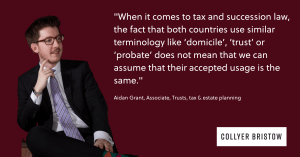- International trusts, tax and estate planning
- UK/USA Tax & estate planning

Longer Reads
UK Register of Overseas Entities
An Outline of the UK’s new register of overseas entities under the Economic crime bill.
1 minute read
Published 9 August 2022
Key information
On 1 August 2022, the UK’s new Register of Overseas Entities (the “ROE”) came into effect under the Economic Crime (Transparency and Enforcement) Act 2022. The ROE, which is maintained by UK Companies House and is available to the public, records details of the beneficial ownership of “overseas entities” which buy, sell, or transfer property or land in the UK. An overseas entity for these purposes is “a body corporate, partnership or other entity that (in each case) is a legal person under the law by which it is governed.”
Commencement
The register applies immediately from 1 August 2022. It also applies retrospectively to entities which have bought property or land in England and Wales on or after 1 January 1999 (other rules and dates apply for Scotland and Northern Ireland). Those entities which are now obliged to register must do so by 31 January 2023.
Additional information must also be provided for any entity which disposed of property or land after 28 February 2022. In future, HM Land Registry will be prevented from registering an “overseas entity” as a proprietor of registered property unless that entity has first obtained an “Overseas Entity ID”. From 5 September 2022, an overseas entity will also need an Overseas Entity ID before it is able to dispose of registered property.
Criminal sanctions for non-compliance
Failure to comply with this new registration requirement carries a penalty of up to £2,500 per day or a custodial sentence of up to five years, notwithstanding the restrictions on buying and selling land that arise from not possessing an Overseas Entity ID.
Trusts
If UK property is held via a trust, this does not itself give rise to a disclosure obligation because the trust is not an overseas entity. However, if the trustee of such a trust is a non-UK corporate trustee (as is often, perhaps usually, the case), then the trustee may itself be obliged to disclose its own beneficial ownership structure in accordance with the principles summarised above.
Comment
The UK has been increasing its reporting and compliance obligations on UK and overseas structures and that trend seems set to continue for the foreseeable future. The ROE is just the latest example of that. Given the number and complexity of the various reporting regimes, including the Register of Persons with Significant Control of companies, HMRC’s Trust Registration Service (which itself has recently been expanded in scope), and now the ROE, affected entities are likely to find themselves liable to report sensitive information to the UK Government under at least one – and sometimes several – of these regimes. Navigating these overlapping requirements can be difficult for the owners and managers of relevant structures (who may not always know that a UK registration obligation has been triggered).
One significant difference between the new ROE and pre-existing schemes is that the ROE has specific – and extremely grave – criminal sanctions for non-compliance, which can include financial penalties and/or imprisonment. The Government is clearly signalling its intention to come down hard on opaque property-owning structures.
Whether the severity of the punishments for ROE non-compliance is appropriate to the scale of the issue is anyone’s guess.
Longer Reads
UK Register of Overseas Entities
An Outline of the UK’s new register of overseas entities under the Economic crime bill.
Published 9 August 2022
Associated sectors / services
Authors
On 1 August 2022, the UK’s new Register of Overseas Entities (the “ROE”) came into effect under the Economic Crime (Transparency and Enforcement) Act 2022. The ROE, which is maintained by UK Companies House and is available to the public, records details of the beneficial ownership of “overseas entities” which buy, sell, or transfer property or land in the UK. An overseas entity for these purposes is “a body corporate, partnership or other entity that (in each case) is a legal person under the law by which it is governed.”
Commencement
The register applies immediately from 1 August 2022. It also applies retrospectively to entities which have bought property or land in England and Wales on or after 1 January 1999 (other rules and dates apply for Scotland and Northern Ireland). Those entities which are now obliged to register must do so by 31 January 2023.
Additional information must also be provided for any entity which disposed of property or land after 28 February 2022. In future, HM Land Registry will be prevented from registering an “overseas entity” as a proprietor of registered property unless that entity has first obtained an “Overseas Entity ID”. From 5 September 2022, an overseas entity will also need an Overseas Entity ID before it is able to dispose of registered property.
Criminal sanctions for non-compliance
Failure to comply with this new registration requirement carries a penalty of up to £2,500 per day or a custodial sentence of up to five years, notwithstanding the restrictions on buying and selling land that arise from not possessing an Overseas Entity ID.
Trusts
If UK property is held via a trust, this does not itself give rise to a disclosure obligation because the trust is not an overseas entity. However, if the trustee of such a trust is a non-UK corporate trustee (as is often, perhaps usually, the case), then the trustee may itself be obliged to disclose its own beneficial ownership structure in accordance with the principles summarised above.
Comment
The UK has been increasing its reporting and compliance obligations on UK and overseas structures and that trend seems set to continue for the foreseeable future. The ROE is just the latest example of that. Given the number and complexity of the various reporting regimes, including the Register of Persons with Significant Control of companies, HMRC’s Trust Registration Service (which itself has recently been expanded in scope), and now the ROE, affected entities are likely to find themselves liable to report sensitive information to the UK Government under at least one – and sometimes several – of these regimes. Navigating these overlapping requirements can be difficult for the owners and managers of relevant structures (who may not always know that a UK registration obligation has been triggered).
One significant difference between the new ROE and pre-existing schemes is that the ROE has specific – and extremely grave – criminal sanctions for non-compliance, which can include financial penalties and/or imprisonment. The Government is clearly signalling its intention to come down hard on opaque property-owning structures.
Whether the severity of the punishments for ROE non-compliance is appropriate to the scale of the issue is anyone’s guess.
Associated sectors / services
- International trusts, tax and estate planning
- UK/USA Tax & estate planning
Authors
Need some more information? Make an enquiry below.
Subscribe
Please add your details and your areas of interest below
Article contributors
Aidan
GrantPartner
Specialising in International trusts, tax & estate planning, Private wealth, UK trusts, tax & estate planning and US/UK Tax & estate planningJames
AustenPartner
Specialising in UK trusts, tax & estate planning, Private wealth, Tax disputes & investigations and Trusts & Inheritance disputes
Enjoy reading our articles? why not subscribe to notifications so you’ll never miss one?
Subscribe to our articlesMessage us on WhatsApp (calling not available)
Please note that Collyer Bristow provides this service during office hours for general information and enquiries only and that no legal or other professional advice will be provided over the WhatsApp platform. Please also note that if you choose to use this platform your personal data is likely to be processed outside the UK and EEA, including in the US. Appropriate legal or other professional opinion should be taken before taking or omitting to take any action in respect of any specific problem. Collyer Bristow LLP accepts no liability for any loss or damage which may arise from reliance on information provided. All information will be deleted immediately upon completion of a conversation.
Close













































